› Forums › 2022 Winter Courses › Reading-Year56-Wed(UK)
- This topic has 94 replies, 6 voices, and was last updated April 4, 2023 by
Beth.
-
AuthorPosts
-
-
at 19:15 #28319
Beth
ParticipantSummary for Lesson 1
In today’s class we began our work on My Family and Other Animals, thinking about the genre and historical context of the novel. We began with a fantastic discussion of what the class did and did not like about the book, reflecting on its humour and use of characterisation. We then spoke about the genre of autobiography and the challenges of writing a book in this genre, including the risk of distorted memory, the protests of real life people and deciding how truthful to be. The class then moved on to discussing the history that this book plays off- that of 1930s Corfu and 1956 Britain when it was published. We discussed what these key historical periods could reveal about the book, watching a short clip about the 1950s and thinking about what this reveals about why Durrell wrote the book when he did and in the way he did. Finally, the class thought about their own lives in an autobiographical way, discussing what the tone and themes of their autobiography would be and thinking of key events in their lives that they may tell and whether they would fictionalize parts of their story. Excellent work today class- you all came up with some really impressive analyses of the history behind the book and thought carefully about how the genre affects the telling of the story. I look forward to seeing you all next week and am super happy with all of your work! 🙂
Homework
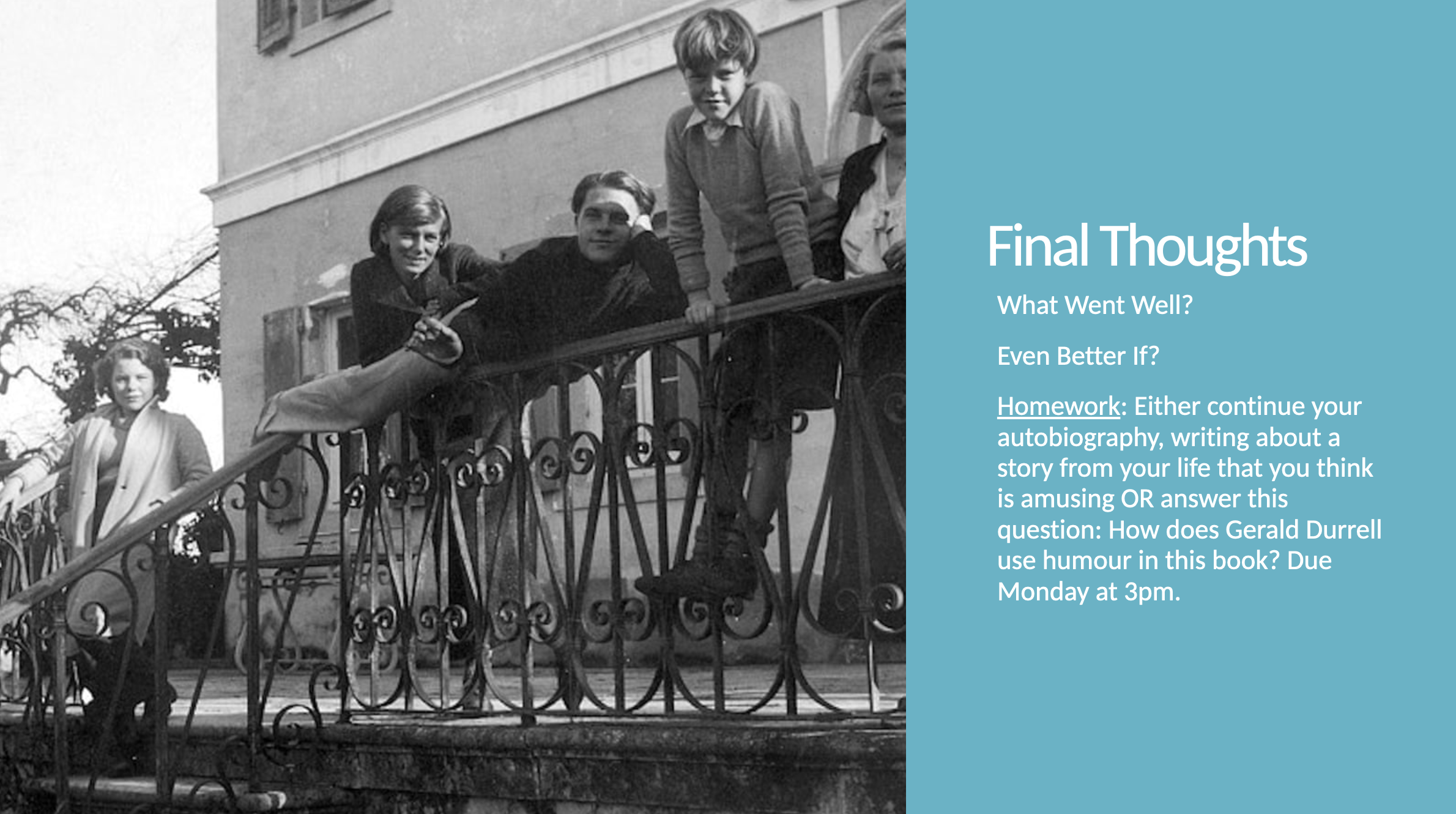
Attachments:
You must be logged in to view attached files. -
at 21:40 #28438
Feite
Participant-
at 12:58 #28540
-
-
at 20:20 #28486
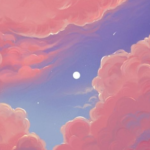 𝐉𝐞𝐬𝐬𝐢𝐞Participant
𝐉𝐞𝐬𝐬𝐢𝐞ParticipantHi Beth,
My homework is attached below.
Can’t wait for our next lesson,
Jessie
-
at 20:21 #28487
 𝐉𝐞𝐬𝐬𝐢𝐞Participant
𝐉𝐞𝐬𝐬𝐢𝐞ParticipantAfter reading Gerald Durrel’s My Family and Other Animals autobiography, it is evident that he creates humour unexpectedly in the middle of pages. On reading Durrell’s memoir, various times I have found myself chuckling once every often. Gerald Durrell’s humour all reflects on his family -which makes them feel embarrassed but amuses the ready lightly. Durrell creates examples of hyperbole and exaggerations by making the family overreact in totally preposterous ways
For example, once the family had settled into Corfu and swept into the city, they were forced to kiss a saint’s feet. This was humorous as Margo had actually committed it (…But I kissed his feet!”). As her goal in life was to cure her acne, she had believed that if she had kissed the saint’s feet, then she would be cured.
Furthermore, Gerry (Gerald) has a love for nature and botany, and due to his huge liking for it, he smuggles a family of scorpions in during dinner and hides them in a matchbox. This once again, is rather humiliating as Gerry describes how the others are reacting “Look out, look out!” or “Hit it with a book!”
In general, Gerry creates humour by expressing the silliness and the pathetic things that his family say and do in and in ridiculous scenarios.
-
at 13:02 #28542
-
-
at 19:18 #28620
Beth
ParticipantSummary for Lesson 2
In today’s class we continued our work on My Family and Other Animals thinking today in depth about character and perspective. We began the class with discussing the notion of Gerry as a character vs. Gerry as the author, with the class completing a research task to aid their thoughts on how to distinguish between the two ideas. We then watched an interview with him, thinking about the questions it raised. We spoke about characters, and the notion of ‘writers are always selling someone out’, applying this to the novel and thinking about the family’s representation. We touched on the power dynamics of the family and how this may have influenced the tone of the novel, before finally the class wrote some excellent pieces reimagining a scene from the book from a different character’s perspective, ruminating on how they would present themselves to the reader and what would differ from Durrell’s original account. Wonderful work today everyone- you were bright, enthusiastic and engaged all lesson and it was a pleasure working with you all today! Keep up the great work and I’ll see you very soon 🙂
Gerald Durrell documentary we watched a clip of: https://www.youtube.com/watch?v=l1MK6BKrc-U
Homework
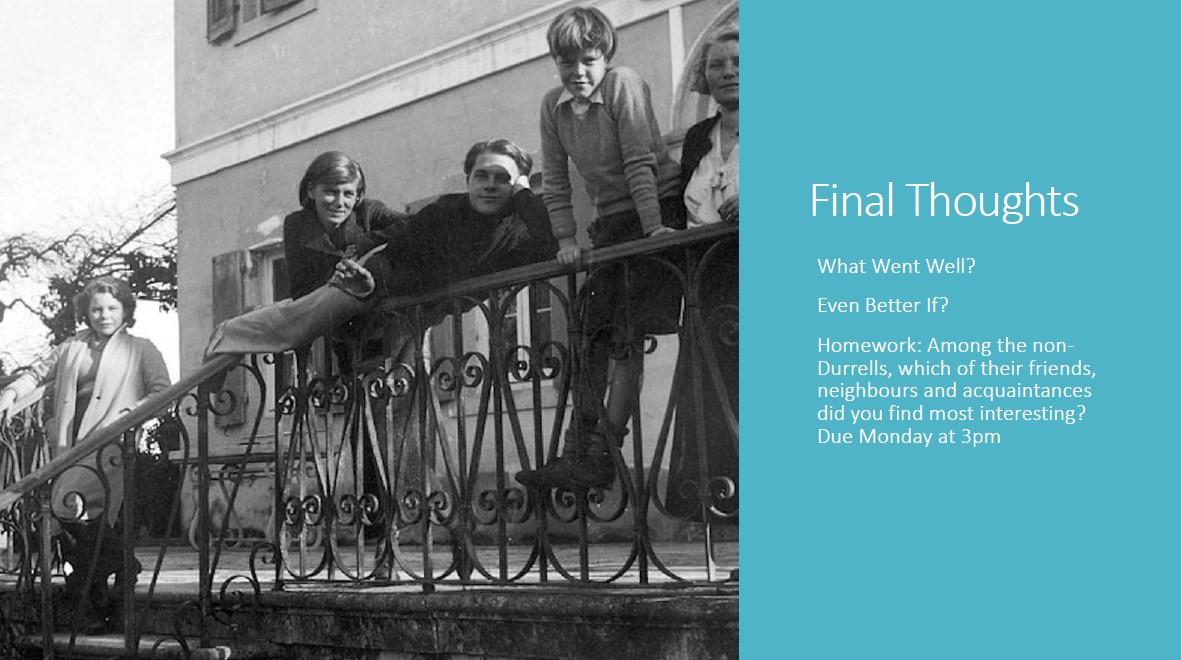
Attachments:
You must be logged in to view attached files. -
at 21:38 #28648
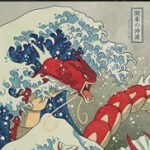 jaydenPParticipant
jaydenPParticipantDear Beth,
Thank you for the stunning lesson
I really liked it
thank you again
homework is attached below…
Attachments:
You must be logged in to view attached files.-
at 19:25 #28760
-
-
at 17:16 #28676
Isabella
ParticipantI found Spiro the most interesting when he first met the Durrells, he said ‘I’ll takes yous anywheres. Just you says.’ It’s very strange when you meet someone for the first time and you will take them anywhere they want. Also, we don’t really get much of his backstory which is a shame because he is very important in the book. For example, if there was no Spiro, the Durrells would have no place to live in Greece. Also, I find it quite interesting that one character can do so much and change the story. I also think it is very strange that Spiro has such a strong accent because a greek accent is easily distinguishable and I found it quite hard to understand what Spiro was saying. This is why I think Spiro is the most interesting character.
-
at 19:29 #28762
-
-
at 20:27 #28679
 𝐉𝐞𝐬𝐬𝐢𝐞Participant
𝐉𝐞𝐬𝐬𝐢𝐞ParticipantDear Beth,
Here is my homework; I wrote about Theodore.
Thank you,
Jessie
-
at 20:29 #28680
 𝐉𝐞𝐬𝐬𝐢𝐞Participant
𝐉𝐞𝐬𝐬𝐢𝐞ParticipantIn Gerald Durrell’s memoir (novel) My Family and Other Animals, there are many characters which stand out. One of them is Theodore, a biologist whom Gerry meets through his past tutor George (Larry’s friend).
Quite different to ordinary people like you and I, Theodore has a rather long white bushy beard (which Gerry believes is compelling evidence that he’s a distinguished scientist). He quickly becomes one of Gerry’s friends and as he’s one of the few non-family adults who treats Gerry like an adult and also shares his love and curiosity for the natural world. Theodore teaches Gerry in a way that makes Gerry feel as though Theodore isn’t actually teaching, “but rather is reminding Gerry of things he already knew and forgot about.”
In some ways, we can see that Theodore is rather silly and immature. Gerry counts Theodore as childish in many ways: he loves to watch seaplanes land and is very embarrassing as well as strangely awkward when it comes to talking and greetings. “I.. ah..ah…yes.. Um…yes, exactly that.”
However, if you put those things behind his unique personality, it is quite straightforward that he is a diligent and intelligent, Having a large library filled with books, on “sensible subjects, such as biology, botany, and folklore, as well as a collection of mystery and crime novels that he shares with Mother.” He’s also a trained doctor, so able to heal and diagnose various injuries.
Theodore and Gerry are similar, having the same passion for wildlife and nature. During the Durrells’ time in Corfu, Theodore and Gerry meet weekly to wander around outside and collect specimens in nature.
-
at 19:33 #28764
-
-
at 20:30 #28807
leyan
ParticipantDear Beth,
Thank you for the lesson
My homework is below
-
at 20:30 #28808
leyan
ParticipantMy favourite character is Dr Theodore Stephanides, a marine biologist(a job I like). I also like this character as he is always impeccably dressed and has a long beard. Furthermore, he is Gerald’s mentor and shares his love and curiosity with the world. Also, he has a library of books which include the types: biology, botany, and folklore. This amazes me as I am astounded that he has a library! As well as being a marine biologist, he is also a trained doctor who can diagnose various wounds. This is surprising as he has trained to master marine biology and medical terms, which are very hard to master! Inferring from that, we can guess he is incredibly intelligent and clever. Also, I find it quite hilarious that he is strangely awkward when it comes to greetings, implying from, “I.. ah..ah…yes. Um…yes, exactly that.”
-
at 20:47 #28813
leyan
ParticipantDear Beth,
Sorry for the late work,
This is homework for week 1 .
-
at 20:47 #28814
leyan
ParticipantHaving read My Family and Other Animals, I can say that humour unexpectedly jumps out of nowhere. You could be in the middle of the book and suddenly be laughing hysterically. The author uses humour in a fascinating way.
Firstly, as Gerald loves nature, he smuggled some scorpions into a matchbox, due to liking them. This is rather hilarious as the others are reacting with phrases like this “Look, out, look out,” and “hit it with a book,”
Secondly, when the family moved into Corfu, they were forced to kiss a saint’s feet. This is quite humorous as Margo had actually thought that if she kissed the saint’s feet, she would be cured of acne. As he one goal in life was to cure acne, she kissed the saint’s feet.
All in all, the book My Family and Other Animals expresses humour by creating scenes when people are in scenarios and do stupid things to try to get out of them.
-
at 15:38 #28857
-
-
at 20:55 #28815
Feite
ParticipantHi Beth,
here is my homework for lesson 2. Sorry I couldn’t put it in slide.
Theodore
I feel like Theodore is my favourite character among the ones that aren’t the main family characters. Because of the bond he has with the main character and also his characteristic with nature every bit of it. He is so fun and he is really described as a friend. I love how the main characters think he is super clever. It’s so fascinating. He doesn’t feel like a side character. Because of all the details about him, how he looks at nature, how he plays with the main character, how he treats him, all looks like an adventure. Come on, don’t you love how he speaks? It gives a sense of seriousness without being serious at all how feels like a genius. All the words it feels so scientific when it isn’t. I mean how can you get wrong with this guy. You can explore so much with him. I love how often the main character talks about him and also how he would act.
-
at 15:39 #28859
-
-
at 19:16 #28828
Beth
ParticipantSummary for Lesson 3
In today’s class we finished our study of My Family and Other Animals, today completing some creative tasks and thinking about Durrell’s writing style. We began by discussing the title of the book, identifying the centrality of animals and their personalities within the novel. We read an extract from the book and analysed its themes and humour, before coming up with some creative writing based upon Durrell’s presentation of animal/human bonds. The class spoke about the reference to Hunchback of Notre Dame, analysing its implications, spoke beautifully on the subject of personification and then finally wrote some interview questions for the author. Fantastic and passionate work today everyone- I loved your hot-seating at the end and thought you used your analysis skills fantastically throughout the lesson. Well done and see you soon 🙂
P.S. The article is the word doc below!
Homework
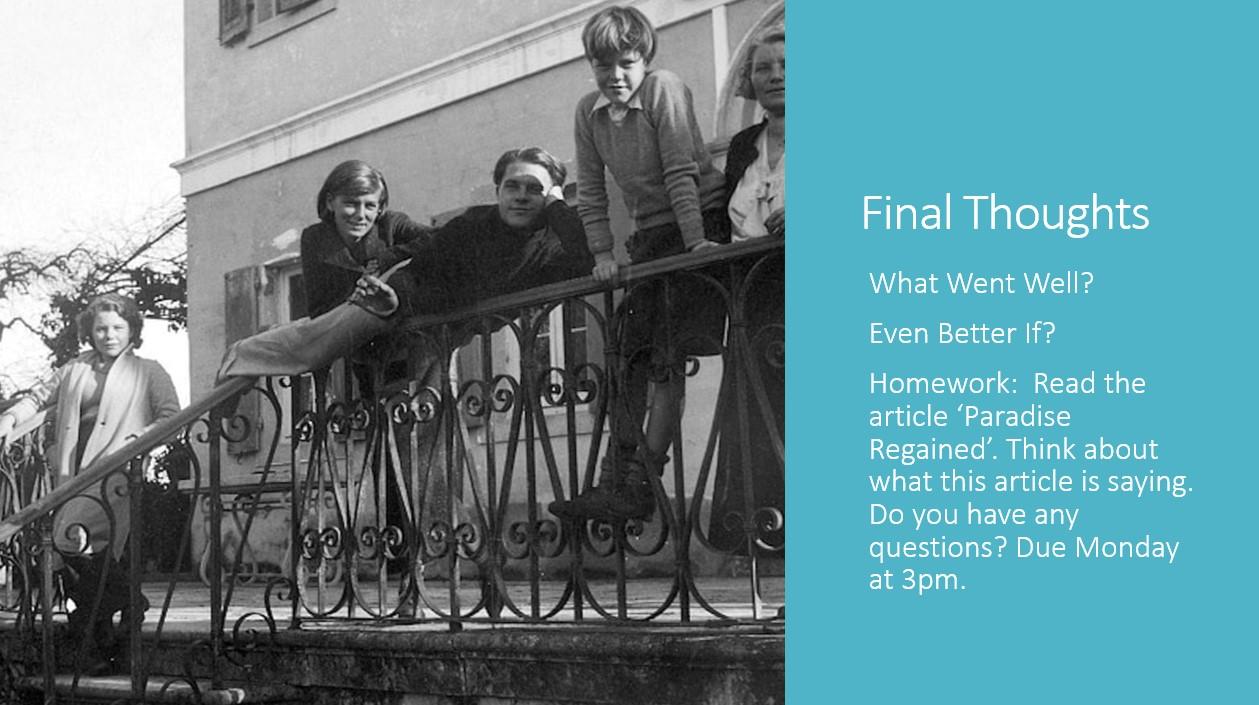
Attachments:
You must be logged in to view attached files. -
at 20:41 #28834
 jaydenPParticipant
jaydenPParticipant- where is the document i cant find it
-
at 14:10 #28849
-
at 19:06 #29061
Beth
ParticipantSummary for Lesson 4
In today’s class we began our second book The Adventures of Tom Sawyer & Huckleberry Finn, thinking today about the historical context behind the book. We spoke about the use of racial slurs in the book and discussed how to treat 19th century language in the modern day with an understanding of the history it underscores. We spoke about US history in the 1870s and 80s and watched a video that detailed the context of the Reconstruction Era and Jim Crow laws. We learned about Twain’s life and linked this to the ideas he explores in the novel, and finally researched the three concepts of slavery, Sentimentalism and the Second Great Awakening, discussing what this tells us about the novel. Wonderful work today everyone- you all thought about the impact of the history on the novel well and came up with some fantastic research points on our three big historical concepts. See you next week and well done 🙂
Context video: https://www.youtube.com/watch?v=2ZGaBrXSWi8
Mark Twain video: https://www.youtube.com/watch?v=cMtBPa7hpsA&t=1s
Homework
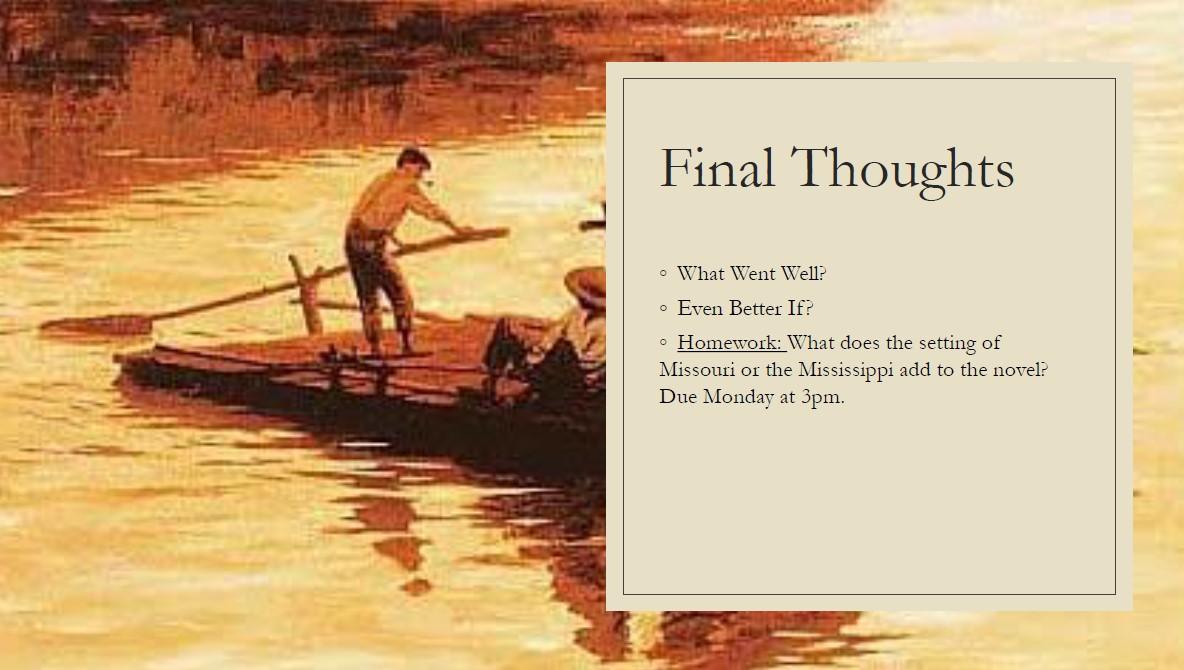
Attachments:
You must be logged in to view attached files. -
at 23:09 #29134
 jaydenPParticipant
jaydenPParticipantDear Beth,
Thank you for the Momentous lesson
my homework is at attached below.
Attachments:
You must be logged in to view attached files.-
at 15:43 #29279
-
at 15:49 #29283
Beth
ParticipantJust a quick note- if you quote from somewhere (i.e., in the line “The river carries them toward freedom: for Jim, toward the free states; for Huck, away from his abusive father “) make sure you say where it is from. All you need to do is to put it in quotation marks and then put brackets after saying where you got the quote from- as I just found this one on sparknotes.
Like this:
“The river carries them toward freedom: for Jim, toward the free states; for Huck, away from his abusive father” (Sparknotes).
-
-
at 16:56 #29208
 𝐉𝐞𝐬𝐬𝐢𝐞Participant
𝐉𝐞𝐬𝐬𝐢𝐞ParticipantDear Beth,
Here is my homework.
Thank you for the wonderful lesson,
Jessie
-
at 16:57 #29209
 𝐉𝐞𝐬𝐬𝐢𝐞Participant
𝐉𝐞𝐬𝐬𝐢𝐞ParticipantAfter reading Mark Twain’s book The Adventures of Tom Sawyer and Huckleberry Finn, the Mississippi and Missouri river is a great deal of importance and symbolism in liberation. Mark Twain has exclaimed that “…The Mississippi River was a sacred place. Every character he came up with he met on the Mississippi.”
For both Huckleberry Finn and Jim Turner, the Mississippi River is symbolised and is indicated as an “icon of freedom.” In the novel, the river carries them toward freedom: Jim, towards the free states; Huck, away from his abusive father and the restrictive civilisation of St. Petersburg.
The Adventures of Huckleberry Finn takes place before the Civil War in South America. As an “adventure,” Huck’s story is defined by movement. The setting of the book starts in the fictional small town of St. Petersburg, Missouri, which Twain based on his hometown, Hannibal, Missouri. After meeting up on Jackson’s Island, Huckleberry and Jim set off along the Mississippi River and passed many places Huck frequently ‘associates this great American river with a sense of freedom’. This sense of freedom is mirrored in the way the Mississippi weaves its way along the border between states, creating a kind of “no-man’s land.”
Although Huck and Jim spend time in towns along the river during their journey, a large portion of the novel takes place in natural settings. Both Huck and Jim possess a great deal of knowledge about nature and the river, knowing the names of trees and the behaviour of animals. Huck describes his natural surroundings, as when he watches the sunrise, saying, “a pale place in the sky” resembling the river. This shows that the river is liked by many and that not only it leads to freedom but it deepens one’s liking towards nature by eloquently describing the river as an “life-sustaining, spiritual force.”
Overall, the Mississippi gives the book a sense of freedom and a taste of the Civil War. Not only that, it can be a wonderful sight to many and a life-saver too. The river provided Huck and Jim with food and shelter.
-
-
at 09:44 #29258
-
at 16:01 #29286
-
-
at 19:13 #29295
Beth
ParticipantSummary for Lesson 5
In today’s class we continued our work on The Adventures of Tom Sawyer and Huckleberry Finn, thinking about character, genre and critical interpretations of the novels. We began with a discussion of character, which the class then used to inspire their own Twain-esque characters, before thinking about genre. We spoke about genres such as semi-autobiography, adventure and bildungsroman- honing in on this subject to think about how Twain subverts the genre of bildungsroman in order to criticise adulthood (and specifically what he thinks of it!). Finally we dug into some critical analyses of the two books, considering the idea of morality in Huck Finn and how powerfully it communicates Twain’s ideas (as much as he may not have wanted them communicated in this way!). The class then were introduced to the notion of ‘two worlds’ in the novels- the idea that the light and the dark that Tom and Huck contend with form the particular backdrop that makes Twain’s work part of the Great American novel canon. Wonderful work class- you all thought brilliantly about the novel and the way in which Twain injects different themes and genres into it. Well done and see you next time 🙂
Huck Finn video: https://www.youtube.com/watch?v=WXKgBIiP8IA
Homework
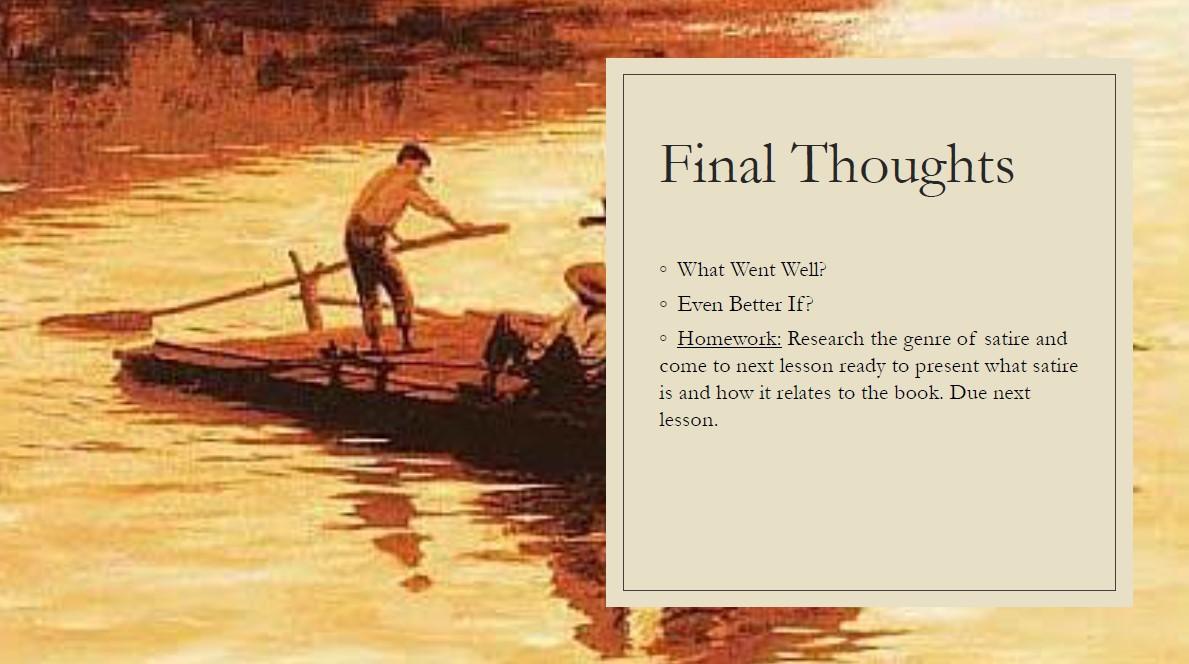
Attachments:
You must be logged in to view attached files. -
at 19:14 #29467
Beth
ParticipantSummary for Lesson 6
In today’s class we completed our work on The Adventures of Tom Sawyer and Huckleberry Finn, thinking today about satire, place & time in the novel and Twain’s views of writing. We began with a discussion of the satire in the novel, thinking this to the themes of religion, racism, adulthood and civilisation and thinking about the message Twain is sending. We learnt about the forward in the book that warns the reader against reading between the lines and discussed why Twain may have written this. We spoke about the character of Injun Joe and the xenophobia evident in his portrayal, learning about the history of Native Americans in the US at the time. Finally, we discussed what makes these books classic novels and the class completed a creative exercise where they created a plot based on Twain’s that utilised specific time and place and touched on satire. Wonderful and energetic work today everyone- well done for all your creative ideas and see you next week 🙂
Homework
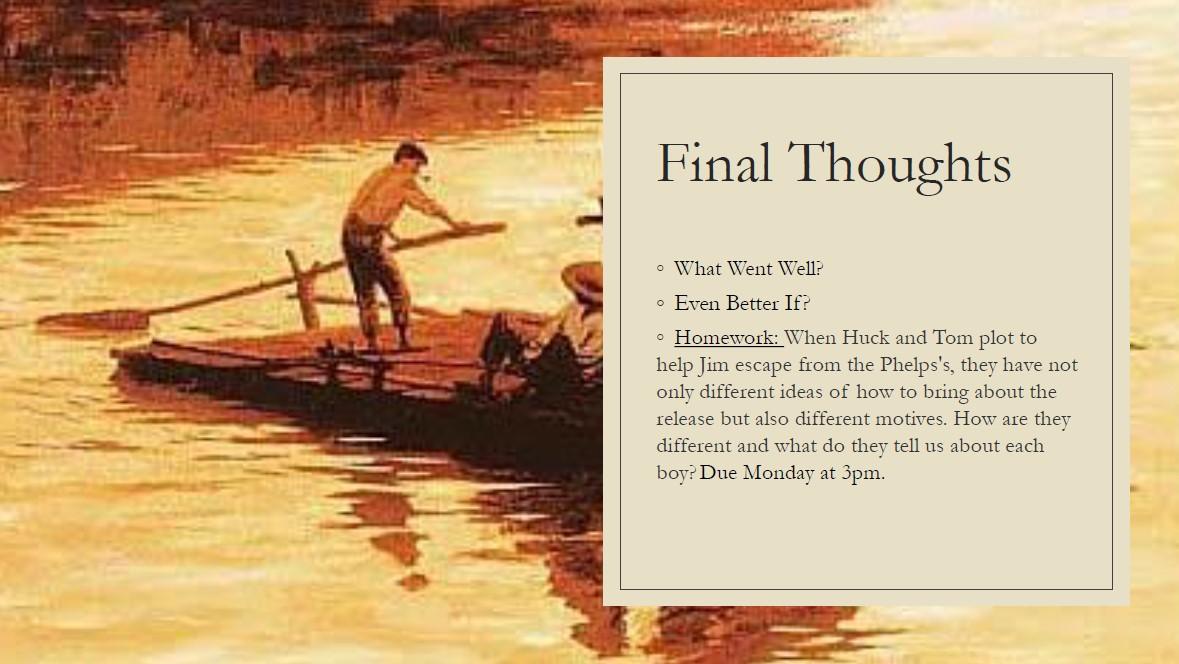
Attachments:
You must be logged in to view attached files. -
at 11:24 #29481
 jaydenPParticipant
jaydenPParticipantDear Beth,
Thank you for the startastic lesson!!!
my homework is attached below
Attachments:
You must be logged in to view attached files.-
at 13:28 #29693
-
-
at 11:25 #29483
 jaydenPParticipant
jaydenPParticipantthe name of the document is in italian – it says thursday sixteenth febraury tom sawyer and huckleberry finn final lesson
-
at 17:23 #29643
 𝐉𝐞𝐬𝐬𝐢𝐞Participant
𝐉𝐞𝐬𝐬𝐢𝐞ParticipantHi Beth,
Here is my homework.
Thank you,
Jessie
-
at 17:24 #29644
 𝐉𝐞𝐬𝐬𝐢𝐞Participant
𝐉𝐞𝐬𝐬𝐢𝐞ParticipantWhen plotting an idea to free Jim, Huckleberry Finn and Tom Sawyer have very different opinions and ideas. As very unique individuals, their ideas are planned on their character of being logical and realistic or adventurous and daring.
Tom Sawyer is an orphan who lives with his aunt, Polly, and his half-brother Sid in St. Petersburg. As a fun, thrill-seeking boy, he frequently skips school to play or go swimming. Tom can also be a talented trickster as he cleverly persuades other children and friends to trade him small treasures for the ‘privilege” of doing his tedious work, using reverse psychology to convince them of its enjoyable nature- “It’s got to be done very careful; I reckon there ain’t one boy in a thousand, maybe two thousand that can do this rare job.’ His personality adds to his idea to free Jim. This is shown as Tom considers Huck’s plan too simple and instead proposes a plot that is ‘worth fifteen of mine, for style’ and considering Huck’s plan as too simple and as ‘mild as goosemilk.’ Furthermore, as an educated boy, he states that Jim will need a rope ladder and a journal because the escape must be done ’just like the prison novels he has read’.
Huckleberry Finn, on the other hand, is free-spirited, reasonable and logical. As having been travelling with Jim, they both do not know that Miss Watson has set Jim free in her will. Huck had the simple idea of first checking whether Jim is really in the shed, then simply stealing Silas’ keys and unlocking the door, allowing Jim to escape. Huckleberry just wants to get things done quickly and keep things simple for Jim. This shows that Huckleberry Finn is thoughtful and caring. Huck also has more experience together with Jim as they travel together and so he knows and is more close to Jim than Tom. The only reason Huck decides to free Jim is because he knows Jim is a human being and should be treated like anyone else. While Huck risks his life and personal freedom to save Jim, this shows his loyalty and kindness towards him whereas Tom rescues Jim for the fun of it.
To conclude, both boys have different ways and reasons why they want to save Jim. Huck, as he is a true friend to Jim, after having many times and experiences with Jim. Tom, as he thinks plotting an escapade will be entertaining and fun.
-
at 13:38 #29695
-
-
at 20:57 #29659
-
at 13:46 #29697
-
-
at 19:13 #29710
Beth
ParticipantSummary for Lesson 7
In today’s class we started our next book, Oranges in No Man’s Land, thinking about the history and setting of the novel. We began with a discussion of what we liked and didn’t like in the novel, before moving on to thinking about the history of the Lebanese Civil War in the 1970s and 80s. We discussed what this book tells us about war and thought about the importance of the setting, analysing an extract from the novel to help us discuss this. We read a piece by the author about her experiences in Beirut and why she wrote this novel, and the class thought of some interview questions they would ask her. Finally we discussed how the presentation of war in this novel compares to war in other books they have read and thought about the focus on WW2 in these books and why it was important to learn about history in different places too. Great work everyone- well done for all your fab ideas throughout the lesson. See you next week 🙂
Lebanon war video: https://www.youtube.com/watch?v=q70bGTwk4VM
Homework
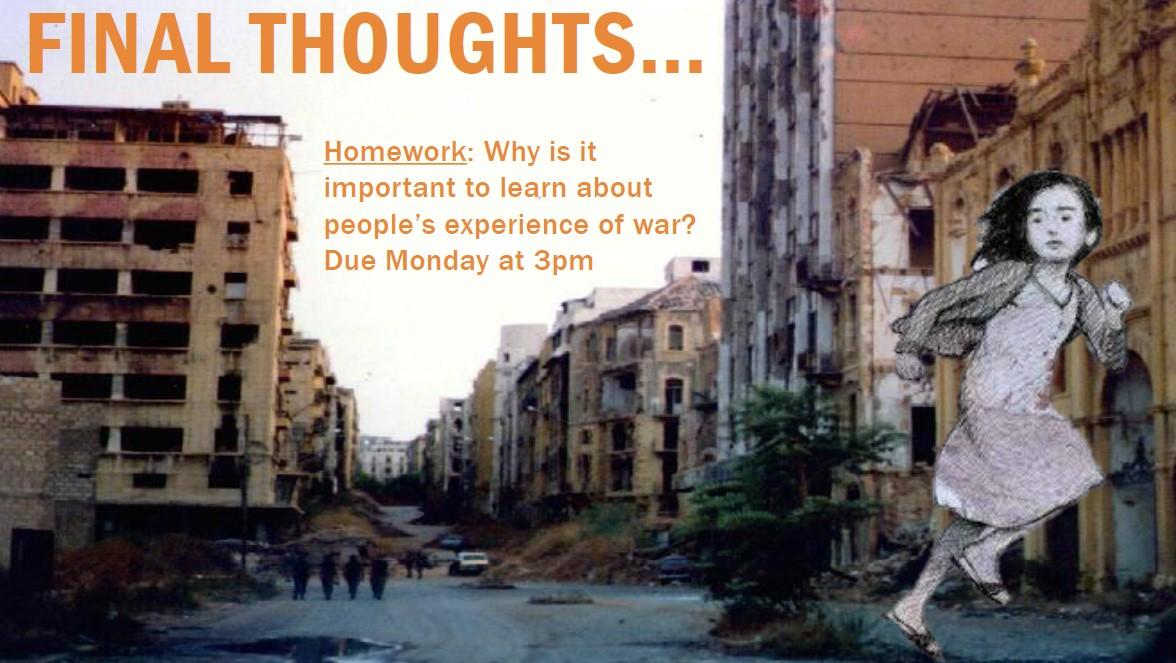
Attachments:
You must be logged in to view attached files. -
at 21:32 #29732
 jaydenPParticipant
jaydenPParticipantDear Beth,
thank you for the fantastic lesson.
my homeworks is attached below.
Attachments:
You must be logged in to view attached files.-
at 16:56 #29881
-
-
at 21:17 #29875
 𝐉𝐞𝐬𝐬𝐢𝐞Participant
𝐉𝐞𝐬𝐬𝐢𝐞ParticipantHi Beth,
Here is my homework. Oranges in No Man’s Land certainly one of my favourites books we’ve read so far.
Thank you for the wonderful lesson,
Jessie
-
at 21:18 #29876
 𝐉𝐞𝐬𝐬𝐢𝐞Participant
𝐉𝐞𝐬𝐬𝐢𝐞ParticipantWar is a terrible experience for many. It is heart-breaking and brutal; many families are torn apart throughout fighting and bombing. So what’s the point of learning about different perspectives of war, why do we need to learn about people’s experiences of war?
It is quite obvious that everyone knows what war is about. Brutality, death and opposition. However, after learning about different individuals, rather than understanding the universal perception of war, it can be more realistic and informative. We can see how people survived wars in detail and their surroundings too. For example, in Oranges in No Man’s Land, we know that Ayesha didn’t evacuate or live in a shack or a run-down, half broken place -like we are normally told. Instead, she stayed in a ‘ building which must once have been a beautiful flat, where rich people had lived’ full of ‘floors made of marble’ and ‘big mirrors on the walls with elaborate goldwork round them’. This proves that many have experienced what is off bounds of what we think war causes, and so experiences can help us visualise more clearly, in detail, surroundings and places which were used as shelter frequently.
Furthermore, studying and understanding experiences can teach us that even though war splits the world, even a tiny country like Lebanon doesn’t mean that there aren’t any good people on the other side. This is shown as when Ayesha crosses the green line to get her Granny some medicine, she bumps into some soldiers who suspect that she is a spy. Here she is saved by Abu Boutros saying, “Are you animals? Persecuting a child? Let her go.” and then he patted Ayesha kindly on the shoulder. Not only that, Dr Leila, also from the North of Lebanon like Boutros, invites the little girl into her home, even when she and her spiteful aunt are busily packing and are about to move to France. Generously, the doctor offers to give Ayesha’s granny a whole ‘supply that will keep her running for a year’ for free. Dr Leila also consoles the young girl when she thinks there is no hope. ‘I think your mama is still looking after us, Habiti’ she says comfortingly.
This is why it is important to people’s experience of war. It can give us a clear picture on how people survived wars especially the Civil War in Lebanon which isn’t touched and covered that often nowadays.
-
at 13:07 #29901
-
-
-
at 22:22 #29877
leyan
ParticipantDear Beth,
This is my homework below,
Please mark it
And thank you for the informative lesson
Leyan.
-
at 22:22 #29878
leyan
ParticipantWar is devastating for many. War is catastrophic to the health and well-being of nations. War destroys communities and families, like when Ayesha lost her mother at the story’s beginning. Furthermore, it often intervenes in the development of the world’s fabrics. But why do we need to learn about it?
Firstly, learning about the catastrophic effects of war can teach us many things about how they live, implying from ‘they were full of people .’ This quote could suggest how hard it was trying to find shelter. Furthermore, learning about wars could give a first-person view as the book was written in the first-person. You could imagine yourself as Ayesha, imagining how she was feeling and what you would do. Because of this war. could be even more informative and lifelike.
Secondly, war can tell us that the opposing side does not mean that there are not any kind and good people on the other side. This can be shown when Ayesha encounters militiamen. She is then rescued by Abu Boutros, who shouts ‘Are you animals’ and ‘persecuting a child?’.
-
at 12:34 #29928
-
-
at 19:17 #29885
Beth
ParticipantSummary for Lesson 8
In today’s class we continued our work on Oranges in No Man’s Land, thinking about character and narrative. We began with a discussion of the class’s favourite characters in the novel, moving on to discussing the way the narrative voice functions in this book. We spoke about how Ayesha as the narrator affects the way the story is told, thinking about how the sides of the civil war are portrayed. The class then completed a great hot-seating exercise, conducting an imaginary interview with Samar, before writing a passage of the book from her perspective. Finally, we discussed how we would change the ending to make it more fulfilling- which the class did a great job of. Lovely work today everyone- I really enjoyed hearing your ideas on perspective and thoughts for how the book should have ended. Amazing work 🙂
Homework
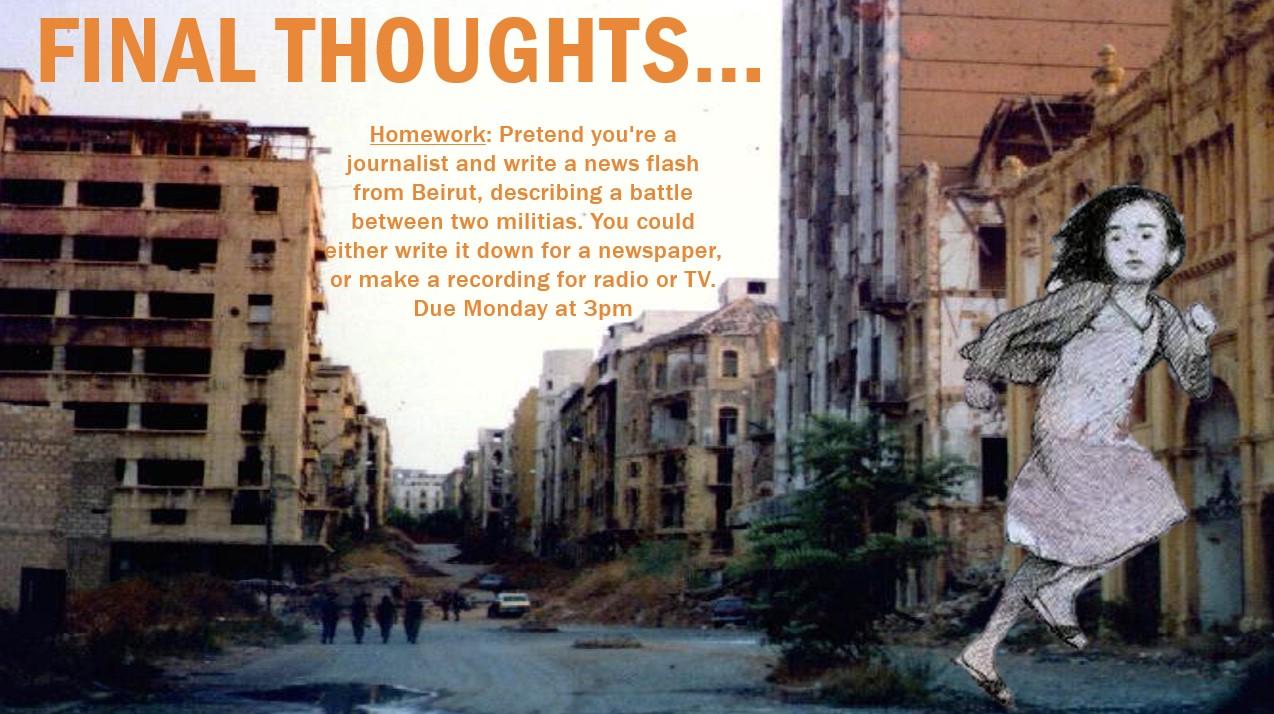
Attachments:
You must be logged in to view attached files. -
at 22:04 #29892
 jaydenPParticipant
jaydenPParticipantDear Beth
thank you for the stupendous lesson!!!
Daily news
Today we come with urgent news, or tragic news… A drastic war is happening in Lebanon, the worst place where one could happen. Now you may be wondering why would I care about a war nowhere near me? If you are thinking like this you should know that you are not considering others. While other countries wage war against each other, people will take refuge into the country of Lebanon. This was until a civil war was declared.
Imagine a world with lush green palms that line each side of a road. The road is a standard one but the rest of the world/county around you is breathtaking. Now imagine the same world but now torn apart by the buildings riddled with bullet holes. Missiles whistling through the air a pile of dead bodies piled high in the valleys. This is sadly what Lebanon has become…
The fighting started on the first of January, but signs of the war had been concealed and unknown to the public. Until on the 5th of august in the sweltering heat of the night, a missile was launched. It whistled through the air with no sound, only tongues of fire rolling across the sky. People ran desperately to get to shelter, once the missile landed a column of fire rolled up from the target, a tiny house. Thankfully only 3 people died while the others all survived this was when the war was clear to begin.
At night guns could be heard the walls were riddled with bullet holes and bullet shells littered the ground. Broken glass spills into the streets like a river flowing into the ocean solid coloured glass looked spectacular. The aftermath was horrible; many had been wounded or died as we walked through the streets piled with dead bodies. Many had been made homeless from the bombing or the gunfire at night. Now we come to this once luxury hotel to visit the people inside to see how many there are. Once we came we found out that there are 170 people in this hotel which is large considering the size of the hotel.
The next year there had been a disaster and there was a nuclear bomb warning… Once the bomb fell through the sky it hit with a force that wiped out the city turning into rebel territory. The destructive bomb was sleek black having enough time to have so much nuclear energy it caused the sky to darken, thunder rumbled. In an instant there was a mushroom cloud that may have been their best attempt but many are alive. Sadly the war still wages but is not a nuclear war. This is all we have about this tragic war.
this is my work.
-
at 13:13 #29970
-
-
at 20:56 #29989
Feite
Participant-
at 16:06 #30070
-
-
at 16:10 #30013
 𝐉𝐞𝐬𝐬𝐢𝐞Participant
𝐉𝐞𝐬𝐬𝐢𝐞ParticipantHi Beth,
Sorry this is late. I enjoyed the homework incredibly.
Thank you,
Jessie
-
at 16:11 #30014
 𝐉𝐞𝐬𝐬𝐢𝐞Participant
𝐉𝐞𝐬𝐬𝐢𝐞ParticipantThe Daily Chronicle
Lebanon is Torn into Two
Lebanon, a small country known for its most miniscule size, has been ripped into two opposing sides. Only having started a couple of hours ago, this small region has experienced chaos and disorder, turning a calm, peaceful market day to unexpectedly the start of war. The war in Lebanon is experiencing a ferocious battle that is still raging on, becoming more aggressive at the second.
Soldiers are lurking at every corner, every checkpoint, looking for intruders. People are straying in different directions like hopeless children across the green line looking for safety. People are screaming and the sense of panic is in the air. Missiles pierce through the stuffy air, and massive piles of rubble and debris lie on the roads causing supplies, ambulances and delivery trucks for the refugees to become almost impossible to get in touch with. On the abandoned streets, market stalls had been forsaken, fruit stalls knocked down, oranges and many other selling items to be scattered around the street.
This is especially a hard time for refugees. Having escaped the previous few wars in neighboring country -Syria- the country Lebanon (which is smaller than Yorkshire) had taken in many foreign refugees. Now, having their new houses bombed, they have to find a new abode to dwell in, along with the Lebanese too. This is troubling as not many standing buildings and flats are still holding, causing one room to be shared by various large families.
When interviewed, one evacuated woman cried, “ It’s such poor luck that I need to leave Lebanon, I’ve grown up here all my life. I just hope everything will improve and the war, which everyone believes is beastly, will soon go away.” One running man swiftly blurted out, “Run children, run, the bombs are dropping and we need to find somewhere safe!” A girl, named Ayesha, who was found homeless with her granny and two brothers tearfully whimpered, “My mother was killed by a bomb and now the rest of us are trying to find shelter and try to settle down. My baby brother Latif has been crying almost every second of the day and we’re all so hungry!”
Lebanon is enveloped in the stench of gunfire and the shrieks of discomforted mothers and children. Approximately, 1,000 have been evacuated so far and the rest of the city, from both sides, prays that this deadly war will soon be over and the calm, relaxing state of Beirut will earn its name back.
-
at 16:16 #30072
-
-
-
at 20:28 #30027
leyan
ParticipantDear Beth,
Thank you for the lesson and sorry for handing in this so late,
My homework is below ⬇️
-
at 20:29 #30028
-
at 16:25 #30074
-
-
at 19:21 #30081
Beth
ParticipantSummary for Lesson 9
In today’s class we completed our work on Oranges in No Man’s Land. We began with a discussion of what the class would call the book if they could choose, thinking about creatively interpreting the story with their own spin on it. We then completed some comprehension, discussing how Laird creates the vivid and powerful setting she does within the book and analysing the language, including examples of simile. Then, in the final twenty minutes, the class designed their own plays based on the novel, identifying elements they had to include (i.e., costume, set design, actors, dialogue) and planning a play around this. They shared these beautifully and then reflected on how to write a book review in preparation for the homework. Really creative ideas today everyone- I loved hearing all your analyses and interpretations of the novel and particularly liked how you turned it into a play. Great job, see you next week 🙂
Book review video: https://www.youtube.com/watch?v=IhYF3v3zTeo
Homework
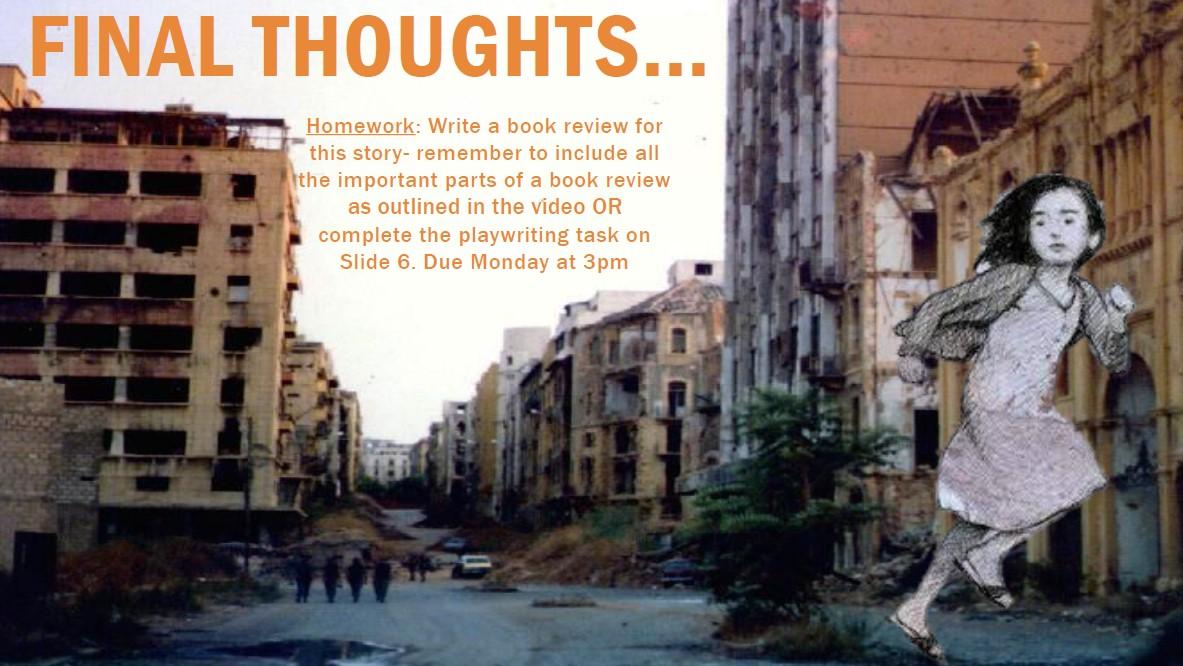
Attachments:
You must be logged in to view attached files. -
at 20:19 #30139
 jaydenPParticipant
jaydenPParticipantdear beth,
thank you for the stupendous lesson
Attachments:
You must be logged in to view attached files.-
at 18:57 #30244
-
-
at 19:43 #30195
-
at 19:45 #30261
-
-
at 17:17 #30238
 𝐉𝐞𝐬𝐬𝐢𝐞Participant
𝐉𝐞𝐬𝐬𝐢𝐞ParticipantHi Beth,
Thank you for the three lessons on Oranges in No Man’s Land, I enjoyed them all.
My homework is attached below and I can’t wait to start Trash!
Kind regards,
Jessie
-
at 17:18 #30239
 𝐉𝐞𝐬𝐬𝐢𝐞Participant
𝐉𝐞𝐬𝐬𝐢𝐞ParticipantSCENE 5:
SOLDIER 1: Timothy Jenkins (unreasonably short soldier)
SOLDIER 2: Jake Roberts (unreasonably tall soldier)
SOLDIER 3: Sebastian Knight (extra scornful soldier)
ABU BOUTROUS: Henry Shepherd
AYESHA 2: Isabella Mcgraphy-Terry
(Bring up SET 5. Ayesha hurriedly runs onto stage, looking left and right hesitantly. The three soldiers come out of their shelter at the sight. Near the end of the men’s shouting lines, Abu Boutrous is walking slowly with a stick slowly in the distance. then stops when he hears the soldiers and all the commotion.)
(Abu painfully and faintly coughs and groans, leaning out of his shelter towards the audience then leans back.)
AYESHA: (screams in pain after stubbing toe by a brick) Ow!
SOLDIER 1: (scornfully, after running out of deserted, dilapidated shelter, seen by ABU) You child, stop right there. What do you think you are doing, this is no zone for trespassing.
(Abu coughs again, backdrop turns darker, eerie crumbling and bombing the distance. Rain machine is activated. Abu walks out of his shelter then scavenges in the ruins.)
SOLDIER 2: (running out too, ABU’S eyes bulging at his words) No playground here, it’s raining, get lost.
(Ayesha pretends to be deaf, face expression confused, then understands, then starts to retreat back)
SOLDIER 3: (fiercely) Stop her. What if she’s carrying messages to the other side underneath that filthy dress of hers? Hold her up captive.
(Abu finally comes out, face appalled. Limps out of his shelter, walking stick in his hand. Backdrop turns lighter. Bombing and gunfire sounds stop. Spotlight shines on him.)
ABU: (sternly) I’m trying to keep my daily life as normal as possible even during this harmful, frightening war. I have been listening to what you’ve all said to this helpless girl and you are making today scary for this girl as well as me. I suggest you let her go and behave yourselves.
(Abu pats Ayesha gently on the head, making a friendly gesture to go and then retreats back into the ruins to scavenge.)
-
at 19:11 #30250
-
-
at 19:13 #30321
Beth
ParticipantSummary for Lesson 10
In today’s class we began work on Trash, our final book of the winter course. We began by discussing what we liked and disliked in the novel before thinking about the setting of the book and what we could ascertain from where the book is set about life in these communities. We spoke about the poverty shown in the story and how Andy Mulligan wanted to draw attention to poverty throughout the world. We watched a video about people who live on landscapes filled with trash like the characters in the novel and spoke about how we never find out exactly where the story takes place. We then read an article about why Mulligan wrote the book and discussed this, thinking about how we can help people in these communities. Finally we discussed the big issues explored in the book, from corruption to homelessness to healthcare- which the class did an amazing job of thinking about. Passionate and thoughtful work today class, I was so impressed by your mature and deep-thinking responses throughout our class, particularly when discussing the big topics in the novel. Really well done, it was a pleasure to see you all today! See you soon 🙂
Here is the homework article: https://eco-business.shorthandstories.com/child-scavengers-casualties-of-the-philippines-war-against-waste/
Video we watched: https://www.youtube.com/watch?v=PiVhL047t9w&t=2s
Guardian article we read: https://www.theguardian.com/childrens-books-site/2015/feb/03/andy-mulligan-trash-movie-stephen-daldry
Homework
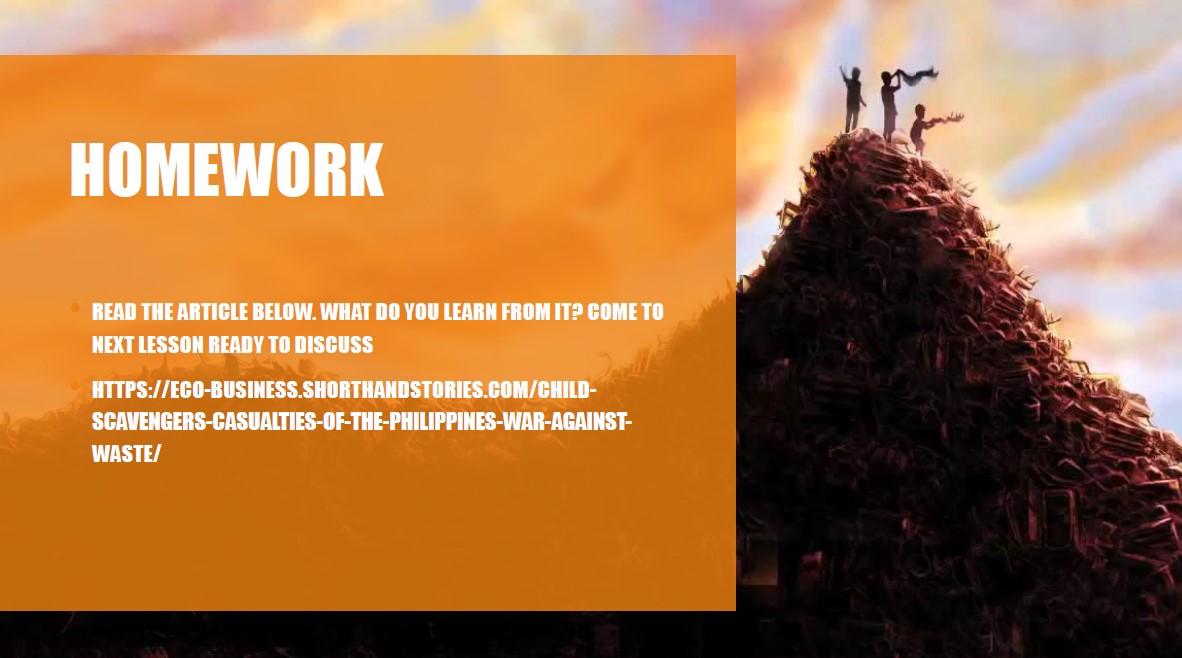
Attachments:
You must be logged in to view attached files. -
at 20:07 #30338
 jaydenPParticipant
jaydenPParticipantthe link doesn’t work!!!
-
at 07:27 #30355
Feite
ParticipantLink doesn’t work
-
at 12:16 #30358
leyan
ParticipantThis is my homework of Oranges In No man’s land week 3
-
at 12:41 #30361
leyan
ParticipantScene 5
Soldier 1: a
Soldier2: another man
Soldier3: another man
Abu Boutros: Old man
( People bring off scene 4 and replace it with scene 5, Ayesha desperately running onto stage, in darting in different directions)
Soldiers 1, 2 and 3 enter.
Soldier 1: Hey, who are you?
Soldier 2: She came from the other side of the Green line.
Ayesha: (stammers) uses hand signals.
Soldier 3: (In a Harsh tone) She stupid and idiotic.
Soldier 3: How do we know you aren’t hiding secret messages under that dress of yours.
Ayesha: (doesn’t speak, uses sign language).
(Abu Boutros enters)
Abu Boutros: What are you? Bullying girls.
Soldier 1: She is idiotic and doesn’t understand a word we say.
Abu Boutros: (Livid tone) That is because she is DEAF!
Ayesha: (Chuckles quietly)
Abu Boutros: No off you go, run quickly.
(Ayesha runs off)
End of Scene 5.
-
at 16:35 #30445
-
-
at 19:15 #30488
Beth
ParticipantSummary for Lesson 11
In today’s class we continued our work on Trash, thinking today about genre, characters, narrative and structure. We began by discussing the homework article, linking this to the context of the book, before discussing the genre of the book and how it uses tension to propel the plot forward. The class thought about the structure of the book, thinking about how the tension rises and falls throughout the storyline. We spoke about the impact of the narrator’s voices and the use of multi-narration and finally, the class honed in on an issue from the novel, writing persuasive letters using the story as inspiration. Wonderful and enthusiastic work today class, well done for all your great ideas and inspiring discussions. See you next week 🙂
Homework
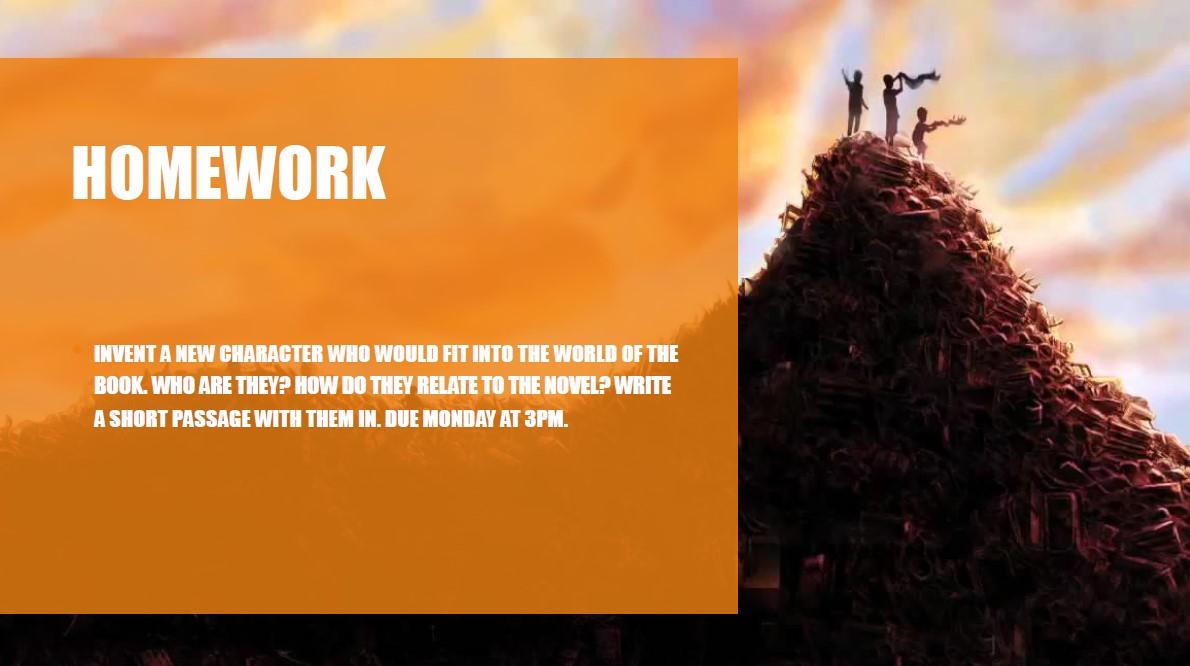
Attachments:
You must be logged in to view attached files. -
at 22:19 #30495
 jaydenPParticipant
jaydenPParticipant-
at 13:07 #30583
-
-
at 16:47 #30585
 𝐉𝐞𝐬𝐬𝐢𝐞Participant
𝐉𝐞𝐬𝐬𝐢𝐞ParticipantDear Beth,
Here is my homework, sorry it’s late! Thanks for the lesson.
All the best,
Jessie
-
at 16:50 #30586
 𝐉𝐞𝐬𝐬𝐢𝐞Participant
𝐉𝐞𝐬𝐬𝐢𝐞ParticipantGardo:
Thanks Raphael. Now it’s my turn. After we found the bag, the 1,100 pesos and all, we started to hide the money, just in case the police find us suspicious again next time they come back and pay us. We couldn’t risk Raphael’s place any longer and so we decided to search through Father Julliard’s school to find any hiding spots, any opening floorbeds. That’s when we bumped into someone life-changing.
As always, Rat and Raphael and I were running up the stairs desperately to find a cabinet or some sort of safe, hoping we would run into luck but we found a boy, most puzzling as ever, peering around in the middle of the landing of the stairs. He was dressed in the most glamorous clothes I’ve ever seen and just one glance at him made the three of us stop in our tracks.
“Oh hello, uhm yes, hello. You may know me as Carlo Basilio, you know the boy who lives on the nearby hill… at least that’s what everyone calls me. Have you seen my father by any chance, he’s head of the police force… and who are you and what on earth are you wearing?” the boy spouted continuously.
“I’m Gardo,” I replied briefly, “This is Rat and this is Raphael, my friends. Your dad has just left the junkyard and is probably on his way back to the police station. Nice to meet you, we’re busy, we need to go.” I answered, not being wholly truthful, I mean we were busy finding a safe.
“Not a chance, wait up, you haven’t answered my question. How can you stand wearing those rags? They’re filthy and say! Wear your shoes and you may want sunglasses, that sun is burning out there.”
I could see Raphael rolling his eyes. Rat’s face squinted in a confused manner, having not known what sunglasses were you know since he’s not been educated (don’t tell him I said that though!) He, the policeman’s son! Having seeing anything to do with the policemen would be the last thing I would do.
Rat:
I’ll carry on from here Gardo. I glared away, bored. I think Raphael could sense that. He breathed deeply and rolled his eyes again, signalling to us that he wanted to move. I couldn’t understand much of what that chatterbox was talking about. All I care about is to survive, not living posh, don’t need a lecture on what I need to get or what I need to wear and eat. If they have money at least they can share!
“Look here, boy, we’re not all rich like you, you know. We live on everything we can afford. We don’t get shoes and we can’t buy shirts either. None of us really care, we just need to find trash to make money.” I interrupted, talking for the fist time.
“Really! Every single one here in Behala. I’ve got to report this to the senator, you all need someone to live and sleep, new clothes and most importantly a bath…”
The young boy kept blabbing but we didn’t have the heart to tell him that the senator would never help, yet it did seem nice of him to pity us, although we didn’t really need it. We’re tougher than we look, now that’s true, even if we didn’t find a safe.
-
-
at 20:56 #30592
-
at 19:09 #30600
Beth
ParticipantSummary for Lesson 12
In today’s class we finished our work on Trash, completing our winter course. Today we spoke about the moral framework of the novel, thinking about the notion of corruption in the novel and linking this to the character of the Senator and the role of the police in the book. We spoke about the crimes committed in the book and the notion of the boys’ Robin Hood mentality. Finally we discussed some big questions in the book such as symbols of inequality, the theme of charity and what the Day of the Dead signifies in the novel. Wonderful and exuberant work today everyone- your ideas were all super inspiring and really powerfully articulated. You have all worked so excellently over the past twelve weeks and should be so proud of all your energy and contributions. It has been so fantastic to teach you all and I have really enjoyed getting to hear all your brilliant ideas- keep up the amazing, intelligent and creative work everyone. Well done 🙂
What is corruption? video: https://www.youtube.com/watch?v=FYorzlkCWYo&t=95s
Homework
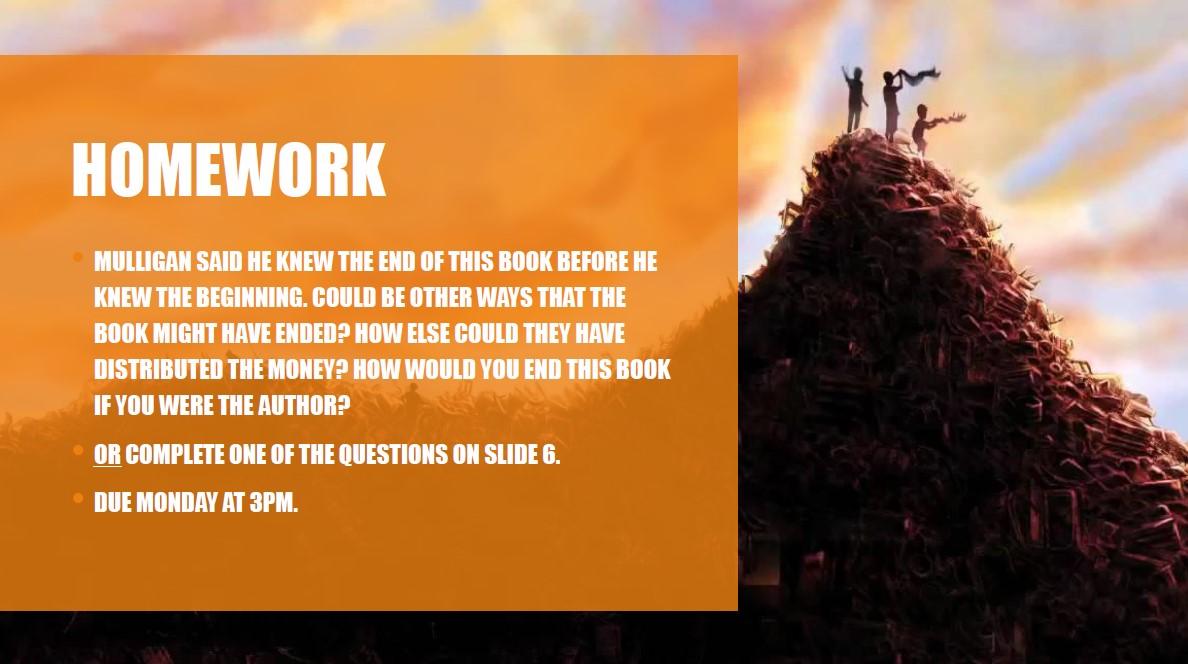
Attachments:
You must be logged in to view attached files. -
at 19:31 #30619
 jaydenPParticipant
jaydenPParticipantDear Beth,
thank you for the outstanding lesson!!!!!!
Attachments:
You must be logged in to view attached files.-
at 14:36 #30653
-
-
at 18:47 #30638
Feite
ParticipantSorry for being late again sorry Beth
Attachments:
You must be logged in to view attached files.-
at 14:36 #30655
-
-
at 09:13 #30640
 𝐉𝐞𝐬𝐬𝐢𝐞Participant
𝐉𝐞𝐬𝐬𝐢𝐞ParticipantHi Beth,
Here is my homework. Thank you so much for the whole course, I enjoyed reading all the different books and Trash is probably my favourite!
Kind regards,
Jessie
-
at 09:14 #30641
 𝐉𝐞𝐬𝐬𝐢𝐞Participant
𝐉𝐞𝐬𝐬𝐢𝐞ParticipantThere are many characters in Andy Mulligan’s novel, Trash, that stand out. One of them is Jun Jun. Having earned his nickname ‘Rat’ from his appearance, he also lives surrounded by rats and rodents underground in a wet trash hole among the rats’ nests. Rat is a streetwise young boy. As an orphan, Rat has to fend for himself. He is a dumpsite boy (approximately 11 years old) and, although he doesn’t seem like it, Rat is one of the richest people on the Behala dumpsite after hiding all of the money he has been gathering.
From the voices of many people, Rat shows us how poverty impacts dumpsite boys like himself, even from a foreigner’s point of view. Sister Olivia is one. As she only writes little, half of the time she is emphasising to reader how unequal the economy it is in Behala. She says “These children are doomed to breathe the stink all day, all night, sifting the effluent of the city. Rats and children, children and rats, and you sometimes think they have pretty much the same life. They’re poor…” and it is said that Oliva Weston just can’t help giving extra shares of money and food to Rat.
Throughout Trash, we get a feel of Rat’s personality. Rat is uneducated, and yet he is extremely smart, witty, and plucky. He is a small but clever boy who really does live up to his name. He is fast but sneaky, dirty but honest and also very amiable. Rat is always getting things from the mission school as he appears to be sweet and useless. He saves the money that he is giving so, surprisingly is one of the richest people on the dump. Several times, especially during a police search across the city, he saves the day with his quick thinking. He is influenced by the inequality going on in Behala. If it weren’t for the police’s brutality, if it ween’t for living alone by himself, he and the dumpsite boys would be having nicely and civilised.
This is how poverty and social classes affect the Behala boys and this is shown extremely well by Andy Mulligan.
-
at 14:38 #30657
Beth
ParticipantExceptional work Jessie- really well done! You’ve very welcome & I am very glad you enjoyed the lessons- I think Trash was my favourite of the books too! I’ve put your feedback for this week and last week on the same document. See you soon 🙂
Attachments:
You must be logged in to view attached files.
-
-
-
AuthorPosts
- You must be logged in to reply to this topic.
